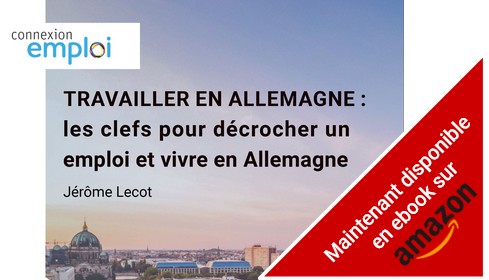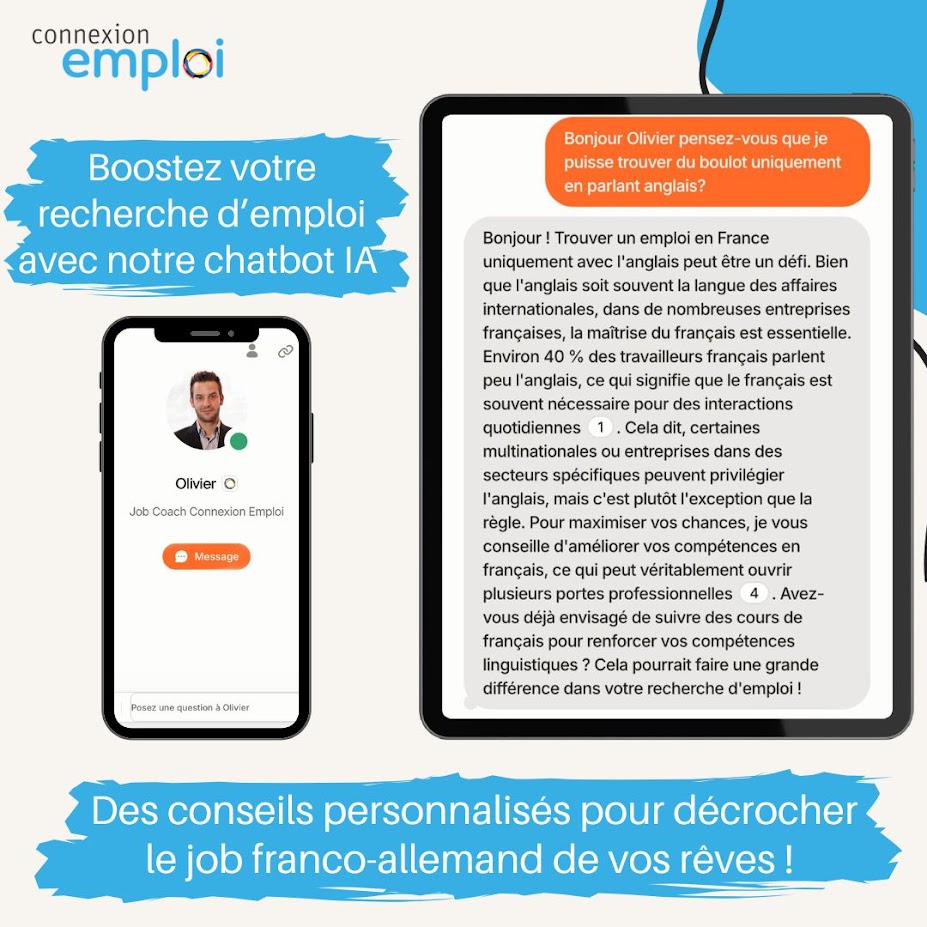Attracting sales candidates in Germany and France: 5 tips

As a foreign company, there are many reasons why you would want to expand to the French and German markets, or go get your talent there. If you want to sell your product across France or Germany, whether you are opening a new branch there or are aiming for those markets remotely, you need someone who is both familiar with the local culture and with your industry. Anything else will waste time and resources. However, nowadays, finding good salespeople is a challenge in France and Germany alike. Both job markets are very tight, with respective unemployment rates of 5 % and 7.3 % in 2023. If you're trying to recruit in France, in Germany or in both, here are our experts' top 5 tips.
2. Write an attractive job description
3. Offer a competitive contract
4. Offer perspectives on possible promotions
5. Let French-German specialists find the perfect salespeople for you

To find the right people more quickly, different methods can be applied depending on the position, its rarity, its specificity, but also the urgency of the recruitment:
Level 1: Using CV libraries
This involves using the market's CV databases, a candidate pool suggested by a service provider, or exploiting social networks. This helps to identify German and French candidates who, having made their CVs available, are open to this approach and therefore to a change.
Level 2: Headhunting
This method allows you to identify the exact profiles you are looking for and to access French and German sales representatives who are operational immediately, have an established customer base and, above all, a perfect knowledge of the market players and pricing & sales practices.
Moreover, this approach implies significant efforts to convince candidates, who, even if they were interested at the beginning, may not sign your ideal contract. Indeed, it tends to make candidates raise their price (+/- 20/30%), as well as upgrade their demands in terms of status and guarantees. As previously mentioned, German salespeople in particular are already very well off. If this is an issue for your budget, and you are open to both France and Germany based salespeople, you can prioritize the French side of the search, which will tend to be a bit cheaper.
The legal notice periods for employees leaving a company in Germany and France are bound to range from a minimum of one month to up to three months. They’re designed to allow the "departing salespeople" to pass on their knowledge and contacts, in order to avoid loss of knowledge and seek a certain continuity. Former employees must train their successors before leaving. Moreover, as customers are reluctant to change their contact person, the successor to the position must be introduced. Talent poaching in Germany is therefore an act that needs to be planned well in advance and requires care, patience and resources.
Passive searching through job offers
Writing a job advertisement is the most common way to search for candidates. It allows you to recruit people who will generally be more grounded in terms of conditions than those who have been approached by ways of headhunting. A majority of salespeople looking for a new opportunity are actually forced to do so, because of layoffs, mergers etc. Those people tend to look for a position that is very similar to the one they previously held.
When it comes to the job description, the cultural differences between both countries absolutely need to be taken into account, because they will directly determine the applications you receive. You can't simply translate the same job offer. You have to appeal to the people's respective values. In their book Managing Franco-German business relations successfully (ed. Springer Gabler), Jochen Peter Breuer and Pierre de Bartha compare fundamental French and German values. As trans-border HR professionals, we deal with the differences they speak of everyday. Here's what you need to know:
Lead with a highly attractive presentation of the company to attract experienced candidates. But what's attractive to whom?
In Germany, the reputation of your company won't do the recruiting for you. Only a small percentage of all candidates will be true risk takers. So highlighting the challenges, responsibilities, status and compensation that come with the job will only get you so far. Instead, underline factors like team-spirit and material advantages. While in France, a household name, an original strategy, and ambitious challenges will attract people, the German employee favors stability over change, sometimes even in spite of a higher income. Don’t be startled, as they will ask for this number almost immediately when commencing contact. You may as well include it in the job description - which you should not do in France.
Describing or selling the opportunity
If aiming for Germans, describe the role precisely, including the products, the market and status of the position inside the larger team, as well as the areas of cooperation between coworkers. Don't idealize the prospects.
French candidates on the other hand will be tempted by the prospect of creative freedom and high stakes (responsibility). The tasks can actually be unreasonably ambitious. The advertisement of the car manufacturer Citroën, for example, proclaims "With us, create the car of tomorrow", even when looking for a simple technician. The task need not be so clearly outlined; it is more important to spark curiosity. The promise of working on an ambitious project is a strong argument, even when that project is barely in the works yet.
Don't take relocation for granted
In either country, avoid making relocation a prerequisite for hiring: salespeople will be moving around all week, but they're still attached to their home region. And by the way, make sure to get Germans a "proper" car if they're expected to move a lot!
Languages
You need employees who know the target clientele and the product, who have interpersonal skills, who are involved, honest and able to communicate with the parent company. As is well-known, many Germans speak excellent English, while in France highly proficient english-speakers are still a bit rarer.
However, the German mentality evens the field in this regard: in both cases, avoid making perfect, oral and written English a prerequisite, because even good candidates can undervalue themselves and will avoid taking the risk of underperforming. If they are uncertain about their ability to fulfill your expectations, they won't even apply. And anyway, you will find it will often be cheaper to pay for language classes than to search for someone who has already mastered a given language.
Age
An experienced salesperson in Germany will usually be mature, as a German enters professional life later than the French, on average. They also have to prove themselves for a few years as an in-house salesman (Innendienst) before they can start working as a field salesman (Außendienst). Since the German school system is non-competitive, students who have just finished their initial training are generally not very independent. As a consequence, younger French salespeople are more common but also get hired more easily.
The age will generally be an indicator of different skill sets:
25-30 years: entry into the job, little experience
30-35 years: intermediate phase, balance between knowledge, involvement and adaptability. This is the stage where they are most interested in a field function.
>35 years old: phase of hierarchical coordination, of "getting things done". Autonomous provided that they have the hierarchical, financial and personnel resources.
Where to post offers
To recruit across borders, don't sideline newspapers. The local press in Alsace and Lorraine (e.g. Dernières Nouvelles d'Alsace or Républicain Lorrain) will have many readers with bi-lingual backgrounds. The major papers of the French national press such as Le Monde, Le Figaro and Les Echos have a wide readership abroad. As for online visibility, the website Connexion-Emploi, the leading Franco-German job board, has a distribution list of over 50,000 members.

Benefits
Once the candidate has been selected, you will offer them an employment contract. Legally fixed social security contributions on the employer's side are much higher in France, so that isn’t a point of concern for French candidates. Germans will expect a complete contractual package, with many advantages and a maximum of guarantees and sustainability.
One such advantage is of course the company car. For German salespeople, the issue of commuting expenses is very important. 68 % of sales representatives in Germany have a company car, which is more than company managers, who only have a company car in 66 % of cases.
In France, where this is considered less important, commonly expected advantages include:
Restaurant vouchers, which are used to finance the employee's lunch
Profit-sharing (commissions)
Company capital formation plan and supplementary health insurance, which gives the employee better access to medical care and higher reimbursements
The job description
Likewise, the job description in the contract for Germans will need to be very precise, clearly stating the extent and limits of all tasks associated with the position. Contrary to the French, they will hardly accept "acting as" positions in which the pay follows later if the tasks are performed successfully.
An organization chart can be used to clearly depict the chains of command. French candidates will rather have a formal job description that leaves a little room for interpretation and individual initiatives.
Compensation
This is a complex matter on which we have written out the details in a separate article. In brief, for recruiting and employee retainment purposes, the pay of course needs to be attractive. To achieve this, multiple factors need to be considered, including the French or German region and the effective purchasing power, the local importance of commissions, the level of experience etc. etc.
You can contact our specialist to get an estimate of what is adequate compensation for your open positions.

Having an interesting job and a motivating salary satisfies some, but not all. Many people may also want a planned future, certain career prospects and contractual guarantees.
German employees want to evolve along a predefined line. The annual interviews will include both a compensation component and a short-, if not medium-term job and career planning component.
Therefore, it is important to have long-term development guarantees in place with the appropriate training support to make them happen. Providing a timeline at the annual interview is a must. Personalized 5 or even 10 year plans will not shock the German employee, who is probably in no hurry and will want to change jobs less frequently than your French employees, who are always concerned about professional development.

Recruiting is already a complicated process inside the confines of your country, so of course, international recruiting is even more complex.
If you want to save time and nerves, you can always let a team of specialists get you quicker, high quality results. Since this is a real need for foreign companies, there are specialized French-German headhunters. They have access to larger talent pools in the specific target area, stay at the forefront of the changing recruiting trends for headhunters in France and in Germany, and master the tools needed to discover top talent.



 Fr
Fr De
De En
En











